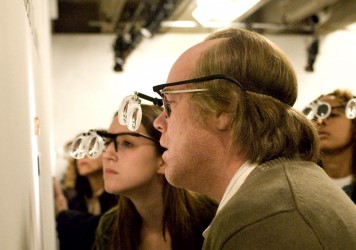Beauty and tragedy abound in Charlie Kaufman and Duke Johnson’s melancholic stop-motion treasure.
Kurt Vonnegut’s 1963 novel ‘Cat’s Cradle’ is about the fictional religion of Bokonism. In it, he invented a new vocabulary for how we evaluate others. The most profound thing you can say about a person is that they belong to your “karass”. This, Vonnegut defines as “a network or group of people who are somehow affiliated or linked spiritually.” Charlie Kaufman wrote Being John Malkovich and Adaptation, and directed Synecdoche, New York, and I am a member of his karass.
We are linked by name and an inward nature, and therefore I naturally accept qualities in his latest film, Anomalisa, that might deter others. Since its premiere at the Telluride Film Festival, the film’s gender politics have been widely discussed. Yet there’s a narrative that is driven by a self-consciously wretched man which both eclipses and consumes this element of the film. The fact that the lead character cannot recognise the depth of others – women and men – is the whole melancholic point.
Michael Stone (David Thewlis) is the loneliest of all of Charlie Kaufman’s lonely men. White, married and joyless, he has grey hair, middle-aged spread and no clear reason for living. Well-meaning conversationalists only grate on his frazzled nerves. Thewlis’ raw Lancashire bark hints at the desperate suffering beneath his auto-politeness. Michael can’t communicate with the people who pass through his life. Their inability to touch him and his inability to perceive them is telegraphed with a bold casting choice that constantly reinforces Michael’s plight while powering a source of hilarity on a par with the ‘Malkovich, Malkovich, Malkovich’ scene in 1999’s Being John Malkovich.
The world that Kaufman has built with the invaluable expertise of co-director and animation whiz, Duke Johnson, is a new sub-genre: social realist stop-motion puppetry. The costly joke is that years of painstaking work has gone into creating sets that are entirely banal. Rather than labouring in the name of fantastical, stylised spectacle like many a proud aesthete, their efforts focus on recreating the architecture of everyday life – like a mini version of the play in Synecdoche, New York. Charlie Kaufman values the intensity that comes from mirroring reality. Watching Anomalisa is like watching a mind trying to escape its own tedious corridors, searching for the sweet release of a meaningful voice next door.
Michael is a guru. His book, ‘How Can I Help You Help Them?’, has established him as a god of the customer service scene. He has flown to Cincinnati to address disciples. The arc is simple. He meets a woman called Lisa (Jennifer Jason Leigh) and thinks that she has changed his life. She is a paragon of insecurity overwhelmed by each drop of tenderness. If his soul is trapped inside, hers spills out in torrents. Their liaison is awkward, touching and driven by his persuasive neediness. Lisa submits at every stage in a way that is not going to win Anomalisa any progressive representation awards, but still has the ring of truth. Some who have gone without intimacy for a long time are just glad to replenish their stocks.
Duke Johnson is unlucky and lucky to co-direct on his debut feature. He’s unlucky because the story is so patently Kaufman-esque (he originally wrote it as a play under the pen name Francis Frejoli) that the credit defaults to the more established artist. But he is lucky because Anomalisa is a hell of a calling card, showing he can deliver a nuanced animation and fulfil an idiosyncratic vision. The most striking aspect of the puppets are their more-human-than-human eyes made from a combination of 3D printed irises, self-repairing silicon and clear resin. “Sadness was a word we used a lot when talking to everybody,” Johnson has said. This is apparent everywhere and particularly in the leaden movements of Michael who drags himself onward like a man in danger of crumpling.
Most of the drama takes place in the soothing but anonymous Frejoli hotel. A steady stream of absurd, perceptive jokes evince Kaufman’s capacity to entertain even while distilling the essence of alienation and the chimeric releases that taunt its sufferers. He is a sad clown. His characters are puppets for solipsistic malaise. Yet he is passionate about humour and the joke count is high.
From unsexy chat-up lines (“Would you like to get a drink, chat about phone system innovation?”) to running gags best left unspoiled to the relish with which the minutiae of hotel life is milked for frustration, Anomalisa is as coloured by external detail as it is fuelled by internal torment. The complexity of the ideas at play is intoxicating both emotionally and intellectually. Kaufman is ahead of his character in delivering the antidote to self-absorption: meaningful communication.
Published 10 Mar 2016
Obviously.
Intricately, brilliantly, tragically solipsistic.
Commitment to mapping a specific type of suffering is never less than absolute.

By Eli Zeger
The writer/director’s hyperreal 2008 debut remains a transformative study of life, love and loneliness.

Charlie Kaufman’s directorial debut is a difficult, maddening and elusive film that’s also intriguing, profound and darkly funny.

One of America’s most lauded screenwriters and a maestro of stop-motion animation have teamed up for Anomalisa.